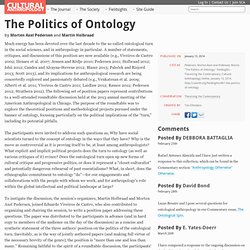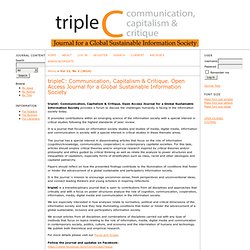

A reader’s guide to the “ontological turn” – Part 2. Home. The Politics of Ontology — Cultural Anthropology. Much energy has been devoted over the last decade to the so-called ontological turn in the social sciences, and in anthropology in particular.

A number of statements, critiques, and discussions of this position are now available (e.g., Viveiros de Castro 2002; Henare et al. 2007; Jensen and Rödje 2010; Pedersen 2011; Holbraad 2012; Ishii 2012; Candea and Alcayna-Stevens 2012; Blaser 2013; Paleček and Risjord 2013; Scott 2013), and its implications for anthropological research are being concertedly explored and passionately debated (e.g., Venkatesan et al. 2009; Alberti et al. 2011; Viveiros de Castro 2011; Laidlaw 2012; Ramos 2012; Pedersen 2012; Strathern 2012). The following set of position papers represent contributions to a well-attended roundtable discussion held at the 2013 annual meeting of the American Anthropological in Chicago. Old.eu.spb.ru/news/files2007/descola.pdf. Vol 1 (2012) Four Lectures given in the Department of Social Anthropology, University of Cambridge, February-March 1998.

A tour-de-force in the anthropology of ours and other cosmologies. The first official version of the lessons which sparked one of the most influential anthropological movements of the twenty-first century. "Eduardo Viveiros de Castro’s seminal lectures on cosmological perspectivism provide a careful and highly innovative introduction to many themes that have become central to the ontological turn in anthropology, including multinaturalism against multiculturalism, transformation/exchange versus creation/production, and performativity replacing representation. They offer invaluable insight into an anthropology operating in a space where we have been neither modern nor primitive.
" - Casper Bruun Jensen, Associate Professor, IT University of Copenhagen, author of Ontologies for developing things: making health care futures through technology (Sense 2010) Table of Contents Introduction. Linguistics and Philosophy. TripleC: Communication, Capitalism & Critique. Open Access Journal for a Global Sustainable Information Society. TripleC: Communication, Capitalism & Critique.

Open Access Journal for a Global Sustainable Information Society provides a forum to discuss the challenges humanity is facing in the information society today. It promotes contributions within an emerging science of the information society with a special interest in critical studies following the highest standards of peer review. It is a journal that focuses on information society studies and studies of media, digital media, information and communication in society with a special interest in critical studies in these thematic areas. 1. Cosmologies: perspectivism — www.haujournal.org. Cosmologies: perspectivism Can the anthropological theorist justifiably deny theoretical insight to his subjects? 1. Cosmologies: perspectivism. At-HQ – Sharing some doubts about the creative industries and how these should be addressed by Cultural Studies.
I have to admit that I have far more doubts and questions than certainties or answers about how the whole socio-economic paradigm opened by the creative industries should be addressed by cultural studies.

The public discourse around the creative industries officially appeared in the UK in about 1996 and was heavily endorsed by New Labour related think tanks (such as DEMOS), to be later introduced by government as a model for economic development; now, twelve years later, academia has introduced the creative industries as a subject matter and this has opened many questions that I believe we should address. How are we going to relate to this economic paradigm? What kind of approaches are best suited to deal with the different conceptual issues raised? What kind of workers are we going to prepare?
These are some doubts among others that need to be raised. Like this: Like Loading... Both comments and trackbacks are currently closed. Www.lawschool.cornell.edu/research/cornell-law-review/upload/Solum-response-final.pdf. Creative Citizenship and the Creative Industries. I always find that the more you know your audience (personally or professionally) the more daunting it is to stand up and present to them about your work.

Studio Studies: Ethnographies of Creative Production – Open panel at the EASST/4S Meeting (Oct 2012, Copenhagen) Studio Studies: Ethnographies of Creative Production – Open panel at the EASST/4S Meeting (Oct 2012, Copenhagen) Postcard from Rome. We are currently witnessing a profound cultural implode which mirrors in its intensity the recent economic collapse.

As the markets round on nations unable to sustain the debt brought upon them through bank bail-outs, and as the proverbial house of cards looks set to spectacularly fall once again, the arts assumes a familiar historical position. European Alternatives. European Cultural Foundation. English. Political Arithmetick by Sir William Petty. Sir William Petty Or a Discourse Concerning, The Extent and Value of Lands, People, Buildings: Husbandry, Manufacture, Commerce, Fishery, Artizans, Seamen, Soldiers; Publick Revenues, Interest, Taxes, Superlucration, Registries, Banks, Valuation of Men, Increasing of Seamen, of Militia's, Harbours, Situation, Shipping, Power at Sea, &c.

Xroads.virginia.edu/~hyper/POE/philfurn.html. By Edgar Allan Poe (1840) In the internal decoration, if not in the external architecture of their residences, the English are supreme.

The Electronic Grosseteste. E-flux. Centre for Imaginative Ethnography. NCRM Training and Events. Frankenstein: The Pennsylvania Electronic Edition. The Sociological Imagination. The Good Project. Errant bodies. Project Lamar.